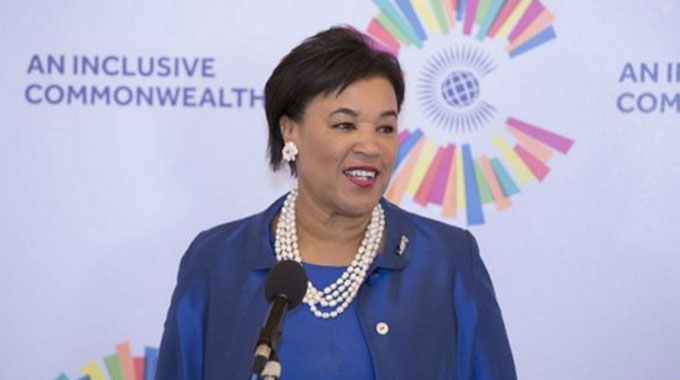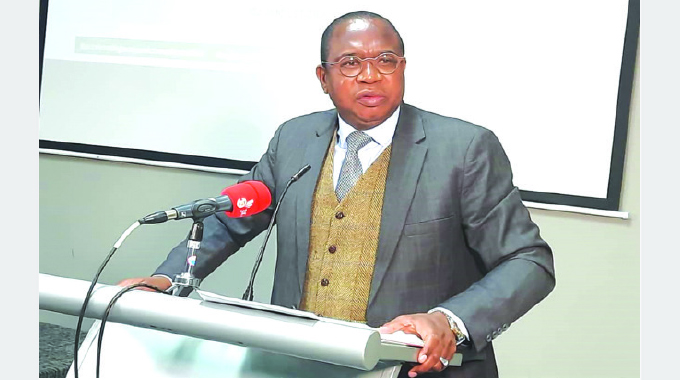Commonwealth set to visit Zim

George Maponga in MIDRAND, South Africa
The Second Republic led by President Mnangagwa is doing a lot to be readmitted into the Commonwealth, and the Club’s Secretariat is expected to travel to Zimbabwe sometime this month to assess the situation on the ground, the group’s secretary general Mrs Patricia Scotland has said.
She said this yesterday during a media conference at the Pan-African Parliament (PAP) in Midrand where she was guest of honour during the official opening ceremony of the first ordinary session of the 6th Parliament.
Mrs Scotland said the secretariat has made its assessment, it will then report back on Zimbabwe’s suitability to re-join the bloc.
“On the question of re-admission of Zimbabwe into the Commonwealth, Zimbabwe has made an application to come home (get back into the Commonwealth fold) and re-joining or joining is a three-stage process,’’ said Mrs Scotland.
“The stage where we are now with regards to Zimbabwe is that the Commonwealth Secretariat will visit the country in November this year and this team will assess the situation on the ground and then report back so that all members of the Commonwealth can come up with a position on Zimbabwe’s application to re-join.’’
Mrs Scotland said she was “delighted that Zimbabwe is putting a great deal of energy and commitment to be re-admitted back into the Commonwealth”.
Under President Mnangagwa, the Government has adopted the engagement and re-engagement policy under which it seeks to mend bridges with those countries that had shut the door on Harare.
President Mnangagwa has declared that Zimbabwe is a friend to all and enemy to none, hence the drive to re-establish relations.
Turning to the issue of illegal sanctions imposed on Zimbabwe by the West, mainly the United States, for repossessing land from the white minority and distributing it to majority blacks, Mrs Scotland said it was “a hot topic”.
“The Commonwealth does not prevail over the sovereignty of individual nations and yes the issue of sanctions on Zimbabwe is a hot issue.
“There are some very strong views that those sanctions should be removed also because of their impact on ordinary people but individual countries can deal with the issue of sanctions on Zimbabwe. I think that issue will be addressed and addressed successfully,” she said.
African leaders have declared their displeasure with the sanctions imposed on Zimbabwe saying they were affecting the entire region, as the manufacturing sector was closing and affected people went to seek jobs.
Last week, South African President Cyril Ramaphosa reignited the issue during a joint press conference he held with Spanish Prime Minister Pedro Sanchez.
SADC has since declared October 25 as the Anti-Sanctions Day, until the sanctions are lifted.
PAP has also added its voice and demanded the removal of the sanctions.
Earlier on Mrs Scotland, in her speech during the official opening ceremony of the First Ordinary Session of the 6th parliament held in the PAP chamber, had challenged PAP to play a leading role in coming up with solutions to a myriad of challenges afflicting the African continent.
President Ramaphosa, who was represented by South Africa Minister of Justice and Constitutional Development, Ronald Lamola, challenged PAP to help to strengthen democracy and the rule of law to ensure prosperity for African people the majority of whom still face a number of challenges.
The South African President also said his government stood ready to assist PAP logistically and materially to plug huge funding chasms but also called other African states to provide resources for smooth operation of the continental legislative body that is housed in South Africa.
In his opening address, PAP president Chief Fortune Charumbira said the process to reform the continental legislative body into something new and better positioned to address African problems was already in full swing.
“Going forward we want to make sure that we closely work with the African Union, we should be visible as a new PAP and be visible in projecting the continent, monitoring and evaluating AU programmes and national parliaments. We are repositioning to a performance-oriented organisation, we want a new image of a better organised PAP,’’ he said.
Chief Charumbira said Africa remained entrapped under scourges of wars, coups, coups within coups and also food shortages, which he said affect the lives of African people especially children.
PAP coffers were also now appallingly low with the continental body being forced to halve its annual budget from US$22 million five years ago, to the current US$11 million which was insufficient to finance operations.
“The voice of the African people should find space in the global development agenda and PAP should evolve into an institution with legislative powers if it is to help in stemming a myriad of challenges afflicting the African continent,’’ said Chief Charumbira.










Comments